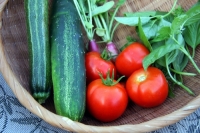On this Thunder Eve, many are anticipating Derby season not for parties and pretty hats, but for playing in the dirt. If you pride yourself on growing food for your family, the Environmental Working Group's (EWG) Shopper's Guide to Pesticides and the UK College of Agriculture Home Vegetable Gardening guide can help you decide what to plant and how to grow it.
Whether homegrown or store-bought, strawberries are always a summertime favorite, but did you know that conventionally-grown strawberries are on the list of the so-called "dirty dozen" which carry the highest levels of pesticide residue?
The Dirty Dozen:
1. Peaches
2. Apples
3. Sweet Bell Peppers
4. Celery
5. Nectarine
6. Strawberries
7. Cherries
8. Kale
9. Lettuce
10. Grapes - Imported
11. Carrots
12. Pears
Growing many of these foods or buying organic are the best ways to avoid ingesting harmful pesticides. While it may not be feasible to plant an apple orchard or berry field, you can grow several from the dozen, and many more from EWG's full list of 47 fruits and vegetables. Of course, you can grow strawberries, too, but they multiply with ninja-like virility, and by the second growing season, I'll bet your Derby hat you'll be a berry farmer.
Minimizing exposure to pesticides by growing foods at home, we can reduce the toxic effects of chemicals in our bodies, some of which remain in our systems for several days, and others for a half century, effecting the nervous system, disrupting hormone balances resulting in reproductive disorders and obesity, and even causing cancer.
While many home garden staples are on the clean side of EWG's full list, the store-bought versions still carry exposure to many pesticides, like green beans, melons, tomatoes, and even lettuce and kale, making them worth growing at home.
Home Vegetable Gardening in Kentucky is a fantastic resource, and the most complete I've ever seen, so as you break ground this Derby season, let it guide you to a plentiful, clean harvest.
Happy Thunder!
Photo: FreeRangeStock.com/Chance Agrella



